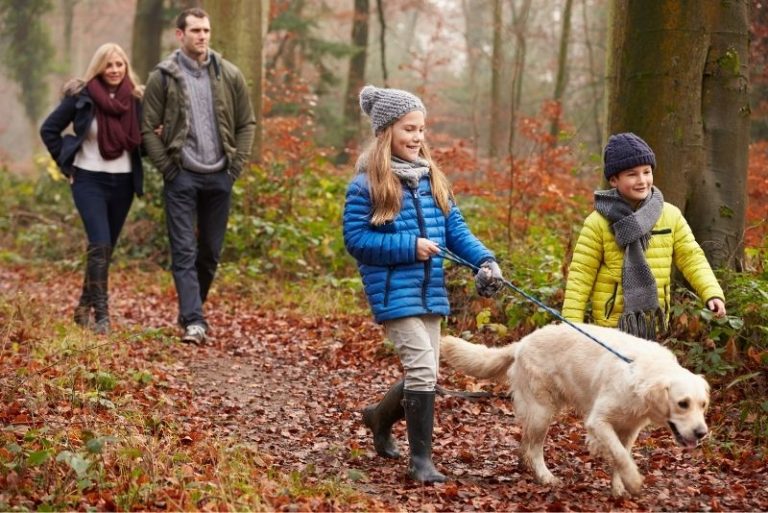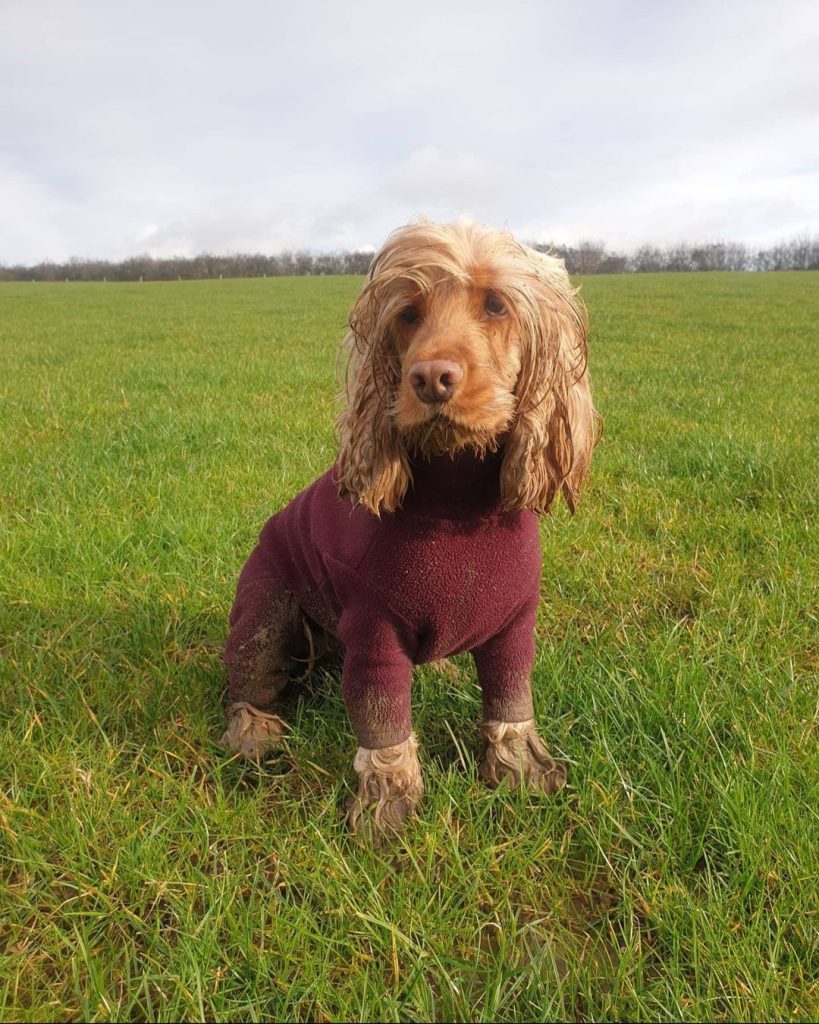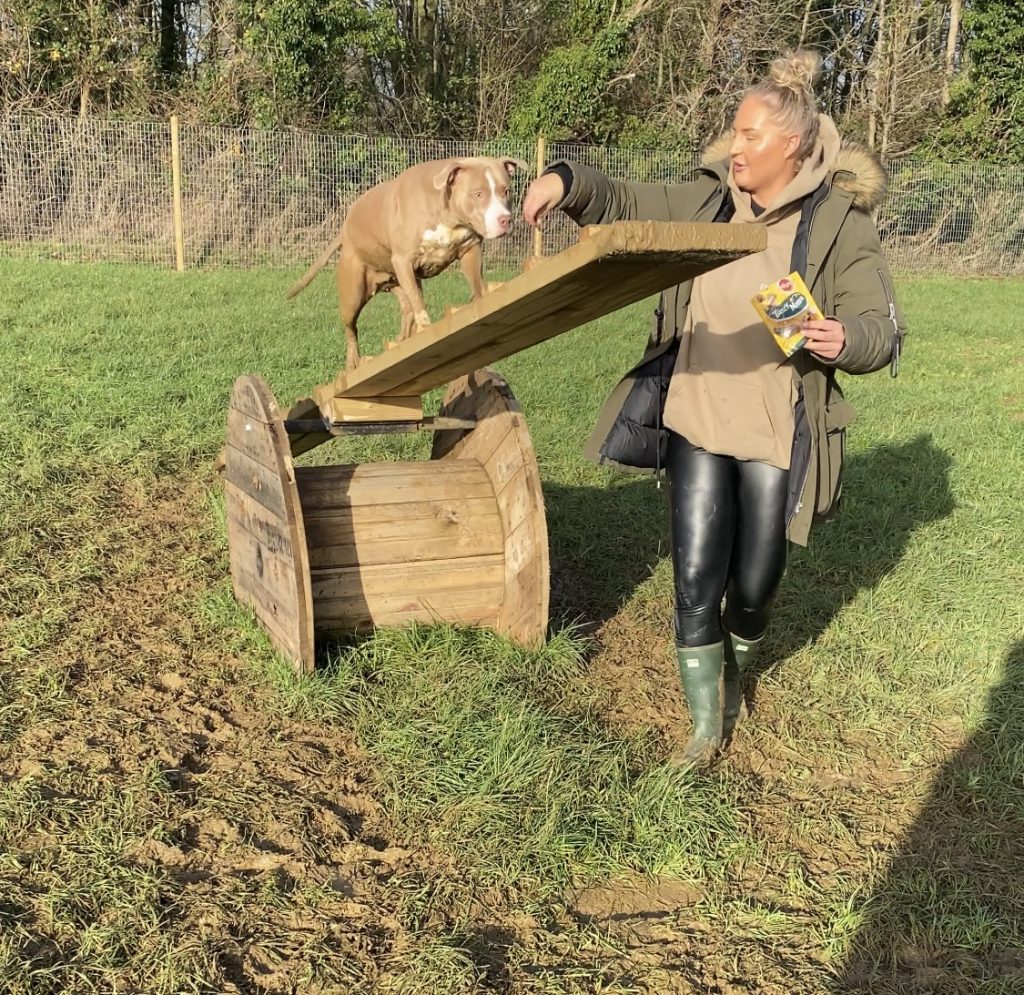With colder temperatures and fewer daylight hours, it’s natural to want to keep out the cold and stay inside. But your pooch probably doesn’t agree! Our canine companions still need their exercise, come rain or shine.
So, bearing this in mind, we’ve gathered our top tips for winter dog walking to keep you and your furry friend happy and healthy!
Be prepared for any conditions
Everyone in the UK knows how unpredictable the weather can be. Yes, you can check the weather before you go and dress appropriately, but it’s not always accurate.
To keep yourself warm and dry, a good waterproof coat is always handy. But it’s also good to bring an extra layer, hat, and gloves with you in a bag or in the car, just in case. If it’s going to get dark while you’re out, take a headtorch and/or hi-vis jacket as extra precautions.
And for your furry friend, make sure their collar is in good condition (so it won’t fall off as they explore), with your address and contact information on, and that their microchip is up to date. Our dog mums and dads at Howden also recommend bringing towels in your car or leaving them by the front door, so you can dry off and clean up any muddy paws.
Both of you should wrap up warm!
While reaching for a cosy jacket is second nature for you, your pooch may not be so keen… But in freezing temperatures, or wet and muddy conditions, a good jacket can be a real benefit for your pet.
If getting your dog to wear a coat is proving a challenge, try training them to get used to it. Introduce the coat at home and let them have a good sniff in their own time. Then, you can place it over them or in their bed, to help them get familiar.
Then, you should gradually let your dog wear the coat in small doses, responding to their reactions. By being patient, and gradually building up wearing a jacket in small doses, you’ll help make it a positive experience for your pooch.
Shine bright to stay visible
Making sure other people, drivers and dogs can see both you and your pet(s) is absolutely vital, especially during the dark mornings and evenings of winter. Use a torch to help you be seen, and to spot trip hazards, unsafe ground, and other dangers. Our Howden dog-owners recommend using a hands-free one, for added flexibility.
And for your dog, reflective harnesses, collars, and leads will help them stay visible, both for other people, but also for you in case they run off! Make sure to keep your dog on the lead in areas of poor visibility, but try a long line so they can still explore.
Follow their lead
Some dogs really enjoy early morning walks, some prefer evening exercise, and some just don’t! They’re all individual, and you know your dog. Keep an eye on them for any signs of discomfort, and don’t force your dog if they’re not happy.
If they don’t like being out in these conditions, then there are other enrichment activities you can try indoors, such as hide and seek or snuffle trays. These can be stimulating, helping to get rid of extra energy and engage all their senses.
“How cold is too cold to walk my dog?”
Again, this is all dependent on your dog as an individual. But there are some factors to be aware of. Firstly, their breed; some need more exercise than others, and some breeds are more suited to cold weather.
Take, for example, a husky compared with an Italian greyhound. One is bred to pull sleds through snowstorms, and one is definitely not! Their size, build and coat thickness all play a part.
Many British dogs come from gundog groups, which are fairly hardy and should be fine for a typical winter walk. Just use common sense if the weather does become extreme. Your dog’s age is another thing to consider. A very young or old canine can’t cope as well in extremely cold temperatures.
Of course, the temperature isn’t always the biggest risk – the ice is. It’s hard to walk on, but then the grit and salt can also be harmful to your pet’s paws, causing dryness, cracking or worst-case, chemical burns. Make sure to check your furry friend’s feet for these symptoms.
Some final key safety warnings to take heed of are to keep antifreeze well out of reach. It’s tasty for dogs, but highly poisonous. Secondly, don’t let your dog walk on frozen bodies of water. You never know when the ice could crack, and it’s certainly too dangerous to jump in after them. If you do find yourself in this situation, try to call them back to you and ring the emergency services.
What do our Howden hounds and their owners say?
Sam Oswald and Oakley the Cocker Spaniel:
“I wish I’d discovered Biothane collars earlier. We used to buy lovely leather or woven collars, but these get wrecked. Biothane wipes clean, which means Oakley can explore muddy puddles galore, and microfibre mitts like you’d use on a car are great at cleaning off paws.
“Equafleeces are also a god send! They are snuggly, but also waterproof, keeping all Oakley’s fur totally dry! Then, you only have to worry about the ears and toes. Finally, Oakley has a little light on his collar that we turn on at dusk.
Abigail Brinkhurst and Koda:
“For any dogs who prefer a solo walk, there are loads of enclosed doggy paddocks popping up everywhere, one in Bathampton and Bradford-On-Avon we take our pooch, Koda, to.
“She loves it! It’s a chance to be off lead in what is essentially your own private Crufts course.”
Shirley Buckingham, Roxy the ‘pocket rocket’ and Woody the Sprocker:
“Bushes, shrubs, stinging nettles, puddles and streams – you name it – they both run right through it and always get wet. When they get home, they tend to lay on Vet Beds.
“They are the easiest things to wash, and they dry super quickly. I would not know what to do without the Vet Beds.”
To speak with our team about your furry friends and your insurance needs, find your local branch and pop in, or give us a ring. Plus, keep an eye out for our Pet Pawtrait events, as we host these free events regularly throughout the year!




